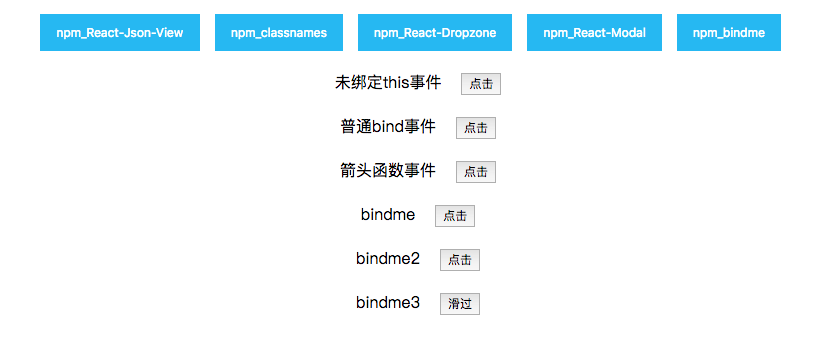一、bindme
官方定义: is a helper to bind a list of methods to an object reference理解: 因为不推荐在render()里构建函数,作者就用了6行代码封装了函数绑定事件的代码.
bindme的npm包实际上由6行ES5代码组成,但是确实方便了很多.这个包值得一用
二、用法
代替箭头函数和多层bind
有时候我们并不会直接在创建事件的时候`bind`,而是统一在constructor上绑定事件,如果一个模块大起来,就会出现好几十行绑定事件的代码,用`bindme`可以很好解决.例如 ``` //原写法 this.clickEvent1 = this.clickEvent1.bind(this) this.clickEvent2 = this.clickEvent2.bind(this) this.clickEvent3 = this.clickEvent3.bind(this) this.clickEvent4 = this.clickEvent4.bind(this) this.clickEvent5 = this.clickEvent5.bind(this)//bindme写法
bindme(this, 'clickEvent1', 'clickEvent2', 'clickEvent3', 'clickEvent4', 'clickEvent5')
又好看又方便
也可以在`super`构建实例的时候绑定
bindme(super(props),
'clickEvent1',
'clickEvent2',
'clickEvent3',
'clickEvent4',
'clickEvent5',
)
就是这么简单的用法, 我们可以看看它的源码转换成ES6是怎么样的
const bindme = (self, ...funcs) => {
funcs.forEach(func => {
if (self[func]) {
self[func] = self[func].bind(self)
} else {
console.error(Method ${func} is not defined)
}
})
}
其实也就是收集所有的事件,再统一bind,如果不存在的抛出异常.我们在平时也会经常封装一些类似这些小的便捷操作
<h3>结合React</h3>
import React,{ PureComponent } from 'react'
import bindme from 'bindme'
import './style.css'
export default class BindmeComp extends PureComponent{
constructor(props){
bindme(super(props),
'bindmeOnMouseOver'
)
this.initClickMode = this.initClickMode.bind(this)
bindme(this, 'bindmeFirClickMode', 'bindmeSecClickMode')
}
noThisClickMode(){
console.log('未绑定this事件 =========>', this)
}
initClickMode(){
console.log('普通bind事件 ===========>', this)
}
arrowClickMode = () => {
console.log('箭头函数bind事件 ===========>', this)
}
bindmeFirClickMode(){
console.log('bindme事件1 ===========>', this)
}
bindmeSecClickMode(){
console.log('bindme事件2 ===========>', this)
}
bindmeOnMouseOver(){
console.log('bindme事件3 ===========>', this)
}
render(){
return(
<div>
<div className="list">
<span>未绑定this事件</span>
<button onClick={ this.noThisClickMode }>点击</button>
</div>
<div className="list">
<span>普通bind事件</span>
<button onClick={ this.initClickMode }>点击</button>
</div>
<div className="list">
<span>箭头函数事件</span>
<button onClick={ this.arrowClickMode}>点击</button>
</div>
<div className="list">
<span>bindme</span>
<button onClick={ this.bindmeFirClickMode }>点击</button>
</div>
<div className="list">
<span>bindme2</span>
<button onClick={ this.bindmeSecClickMode } >点击</button>
</div>
<div className="list">
<span>bindme3</span>
<button onMouseOver={ this.bindmeOnMouseOver } >滑过</button>
</div>
</div>
)
}
}

上面基本覆盖了常用的事件绑定情况.我们看看都会输出什么?

可以看到,除了第一个this为undefined外,其他都是正常绑定在了组件上
<h3>扩展一下React的this</h3>
我们先从我们最熟悉js的`this`说起;
面试官经常会问,什么是this?this指向什么?
一般来说:
<b>谁调用该`function`,该函数的this就指向这个调用方</b>
有一个特殊的情况,ES6的箭头函数,也是面试官特别喜欢的一个东西(但它确实好用),由于箭头函数不存在this,所以它的this是由上一层继承而来的.所以可以得出结论<b>箭头函数的this始终指向构造时的对象,而不是使用时的对象</b>
另外箭头函数还有一些不同于普通函数的特性,比如: 不可以当作构造函数使用,即不可以`new`. 不可以使用`arguments`属性等等
总结一句话就是:
<b>普通函数this是动态的,而箭头函数的this是静态的</b>
<h4>我们细说一下React的this. </h4>
因为React组件是通过`class`构造的,所以组件里的所有属性,所有方法都可以通过this来获取,例如我们经常使用的属性state.就可以通过`this.state.xxx`获取
所以我们只需要保证this永远指向该构造对象(组件)即可,所以我们一般不会通过function来创建函数(会使得this动态指向调用function的对象), 并且:
<b>React组件类的方法没有默认绑定this到组件实例,需要手动绑定。</b>
所以就衍生出了绑定this的方法;常用的有四种,我们一般会使用在constructor里面bind
//优先级最高
constructor(props){
super(props);
this.handleEvent = this.handleEvent.bind(this)
}
这种和直接在构建事件中绑定很像对吧?
我们知道只要state值改变了,就会导致render重新渲染,如果直接在创建事件绑定,那每一次渲染的时候都需要重新绑定一次,会大大降低性能.相反,只要在构造的时候绑定,无论渲染多少次,绑定都还是一次
此外还有比较常用的箭头函数绑定法和::绑定法
前面也介绍了箭头函数this的知识,所以在React出现也是蛮高的
handleEvent = () => {
...
}
<input onChange={this.handleEvent} />
::虽然也可以绑定this,但是因为不能传参数,所以不经常使用
handleEvent = () => {
...
}
<input onChange={::this.handleEvent} />